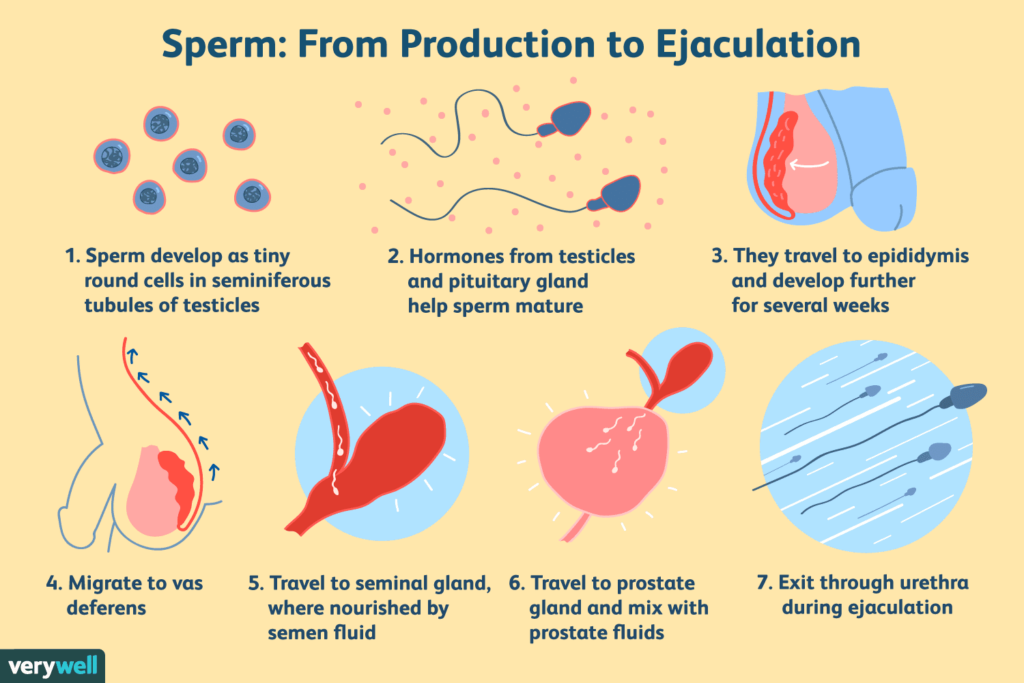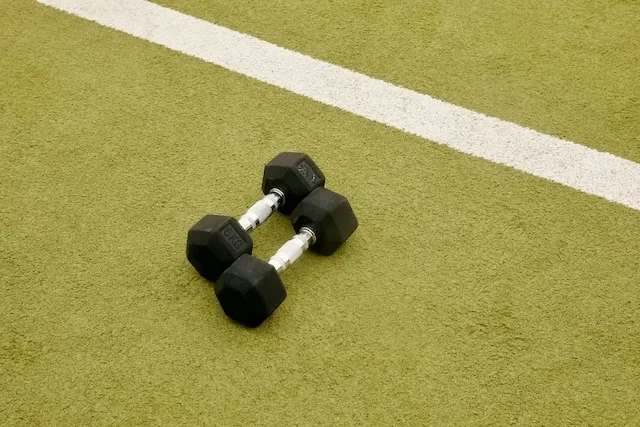Sperm Health: Find Out What’s Ailing Your Swimmers

342
This article will help you understand the basics of sperm health. You’ll learn about the factors that affect sperm quality, how it develops and functions, and common myths about male fertility. Whether you’re just curious or actively trying to conceive, this guide aims to provide helpful information in an easy-to-understand way.
What’s in this article?
A brief overview of the basic principles
Sperm are made in the testicles by a process called spermatogenesisIt all starts with special cells called spermatogonial stem cellswhich are the raw materials for the manufacture of sperm. These cells divide and transform in several steps, transforming into more specialized cells each time. This process is controlled by hormones like testosterone and FSH.
In about 64 to 72 days, these cells become mature sperm. Once fully developed, the sperm move to the epididymis, a tube in which they learn to swim and prepare to fertilize an egg.

The Importance of Sperm Health
Sperm health is important if you’re planning to start a family (among other reasons, of course). Healthy sperm increases the chances of conception and can influence the health of your future child. High quality sperm are active, well formed and abundant, which are all necessary to successfully meet and fertilize an egg. In short, the healthier your sperm, the better your chances of becoming a parent.
General reproductive health means taking care of your body so that all parts involved are functioning well. For men, this means having healthy testicles that produce good sperm and enough testosterone. It also means having good hormonal balance and avoiding things that can harm your reproductive system.
What factors affect sperm health?

The role of genetics
Your genes are like a blueprint for your body, affecting everything from the color of your eyes to the health of your sperm. Certain genetic conditions can disrupt the number, shape, and movement of your sperm. For example, conditions like Klinefelter syndrome or certain Y chromosome problems can lead to decreased sperm production or even infertility. Genetics can impact how your sperm works in a number of ways:

- Count: Certain genetic problems can cause your body to produce fewer sperm.
- Motility: Genetic conditions can prevent your sperm from swimming properly, which they need to reach the egg.
- Morphology: The shape of your sperm can be affected by your genes, and oddly shaped sperm may not function as well.
Environmental impact

Pollutants and toxins
- BPA: Found in some plastics, BPA can mimic hormones and disrupt sperm production. This chemical is often found in water bottles, food containers, and other household items.
- Pesticides: Used on crops, these chemicals can damage sperm if you are regularly exposed to them. They can be absorbed through food, water or even the air in agricultural areas.
- Heavy metals: Lead and mercury are particularly harmful and can reduce sperm count and motility. These metals can be found in contaminated water, fish, and some workplace environments.
- Dioxins: These are by-products of various industrial processes that can be very harmful to sperm health. They can lead to decreased sperm count and motility.
- Air pollution: Exposure to high levels of air pollution, such as particulate matter and nitrogen dioxide, can cause oxidative stress and damage sperm DNA, reducing motility and increasing abnormalities.
Poor ventilation and exposure to indoor pollutants like cigarette smoke, mold and household chemicals can also harm sperm health.
Exposure to radiation
Radiation and electromagnetic fields emitted by electronic devices can negatively impact sperm health. Studies show that exposure to these fields can decrease sperm motility and increase oxidative stress, leading to damage to sperm DNA. Using protective measures, such as placing laptops on desks and using headphones for phones, can help mitigate these risks.
- Laptop : Heat and radiation from laptops can reduce sperm quality, especially when used on your lap for long periods of time.
- Phone(s): Keeping your phone in your pocket can expose your testicles to radiation, which can also be harmful.
Health conditions

- Varicocele It is a condition characterized by dilation of the veins in the scrotum and can lead to a decrease in sperm quality. It is one of the most common reversible causes of male infertility.
- Sexually transmitted infections STIs and other infections can cause inflammation and scarring in the reproductive tract, affecting sperm health.
- Body overweight is linked to hormonal imbalances that can reduce sperm production and increase the proportion of abnormally shaped sperm.
- Chronic stress may negatively affect hormone levels and sperm production.
- Poor quality of sleep and sleep disorders like sleep apnea can disrupt hormonal balance.
The influence of age

As you age, the quality of your sperm may change. Just like other parts of your body, your reproductive system ages too.
General changes
- After age 40, men often begin to see a decreased sperm count. It’s like your body’s production line slows down a little.
- Your sperm’s swimming abilities may decrease. This means they may have a harder time reaching and fertilizing the egg. Think of yourself as an aging athlete who can’t run as fast as he used to.
- The shape of the sperm can get a little wonky with age. Older men tend to have more abnormally shaped sperm, which can make it more difficult for an egg to be fertilized.
- The DNA in your sperm may become more fragmented. This can make conception more difficult and affect the health of the embryo (Frontiers). It’s like having a book with missing pages: things don’t work as well.
Other possibilities
- As the years go by, your body becomes less and less able to fight against oxidative stress, that can damage sperm. Including more antioxidants in your diet can help, but the aging process makes this battle more difficult.
- Testosterone levels naturally decline with age. This can reduce sperm production and affect overall reproductive health. Low testosterone levels can also lead to decreased libido and energy levels.
- The amount of sperm Sperm production may decrease, meaning there are fewer sperm to fertilize an egg. This may be due to changes in the prostate and seminal vesicles, which produce most of the fluid in semen.
Understanding these changes can help you make better decisions about your reproductive health. Maintaining a healthy lifestyle, eating a diet rich in antioxidants, and minimizing exposure to harmful substances are important for keeping your sperm healthy as you age. Regular checkups with a healthcare professional can also help.
Additional factors

- Jobs that involve regular exposure Exposure to industrial chemicals, solvents and heavy metals can harm sperm health. This is the case, for example, for men working in agriculture, painting or manufacturing.
- Occupations that involve prolonged exposure to heat, such as baking, welding or truck driving, can affect sperm production and quality due to increased scrotal temperature.
- Drinking too much alcohol Premature ejaculation can lead to low testosterone levels and poor sperm production. It can also increase oxidative stress and DNA damage in sperm.
- Smoking cigarettes introduces toxins into the body that can reduce sperm count, motility and morphology. This includes secondhand smoke.
- Recreational drugsincluding marijuana and anabolic steroids, can have a significant impact on sperm production and quality.
5 Myths and Facts About Sperm Healthm

Do: Tight underwear can increase the temperature around the testicles, which can affect sperm production and quality. Switching to looser underwear, like boxers, can help keep things cooler and potentially improve sperm health
Do: What you eat can definitely affect the health of your sperm. Diets high in processed foods, sugars, and trans fats can harm sperm, while diets high in fruits, vegetables, and healthy fats can improve sperm quality.
Do: Sperm quality is crucial for all types of conception, including assisted reproductive techniques such as IVF and ICSI. Poor sperm quality can lead to lower success rates for these treatments.
Do: Sperm quality can vary significantly over short periods of time due to factors such as illness, stress, and changes in diet or lifestyle. Monitor your health to make sure there are no warning signs.
Do: Frequent ejaculation does not necessarily decrease sperm quality. In fact, regular ejaculation can help keep sperm healthy by preventing the buildup of older sperm, which may be less motile and have more DNA fragmentation.
Final thoughts
So there you have it, now you know how our activities and even where we live can affect a person’s sperm quality. And while it’s nearly impossible to fight everything, men can pick their battles that also contribute to better overall health. If you’re interested in learning how to make better lifestyle choices to support your swimmers, check out the articles below…


 Anal Beads
Anal Beads Anal Vibrators
Anal Vibrators Butt Plugs
Butt Plugs Prostate Massagers
Prostate Massagers
 Alien Dildos
Alien Dildos Realistic Dildos
Realistic Dildos
 Kegel Exercisers & Balls
Kegel Exercisers & Balls Classic Vibrating Eggs
Classic Vibrating Eggs Remote Vibrating Eggs
Remote Vibrating Eggs Vibrating Bullets
Vibrating Bullets
 Bullet Vibrators
Bullet Vibrators Classic Vibrators
Classic Vibrators Clitoral Vibrators
Clitoral Vibrators G-Spot Vibrators
G-Spot Vibrators Massage Wand Vibrators
Massage Wand Vibrators Rabbit Vibrators
Rabbit Vibrators Remote Vibrators
Remote Vibrators
 Pocket Stroker & Pussy Masturbators
Pocket Stroker & Pussy Masturbators Vibrating Masturbators
Vibrating Masturbators
 Cock Rings
Cock Rings Penis Pumps
Penis Pumps
 Wearable Vibrators
Wearable Vibrators Blindfolds, Masks & Gags
Blindfolds, Masks & Gags Bondage Kits
Bondage Kits Bondage Wear & Fetish Clothing
Bondage Wear & Fetish Clothing Restraints & Handcuffs
Restraints & Handcuffs Sex Swings
Sex Swings Ticklers, Paddles & Whips
Ticklers, Paddles & Whips












